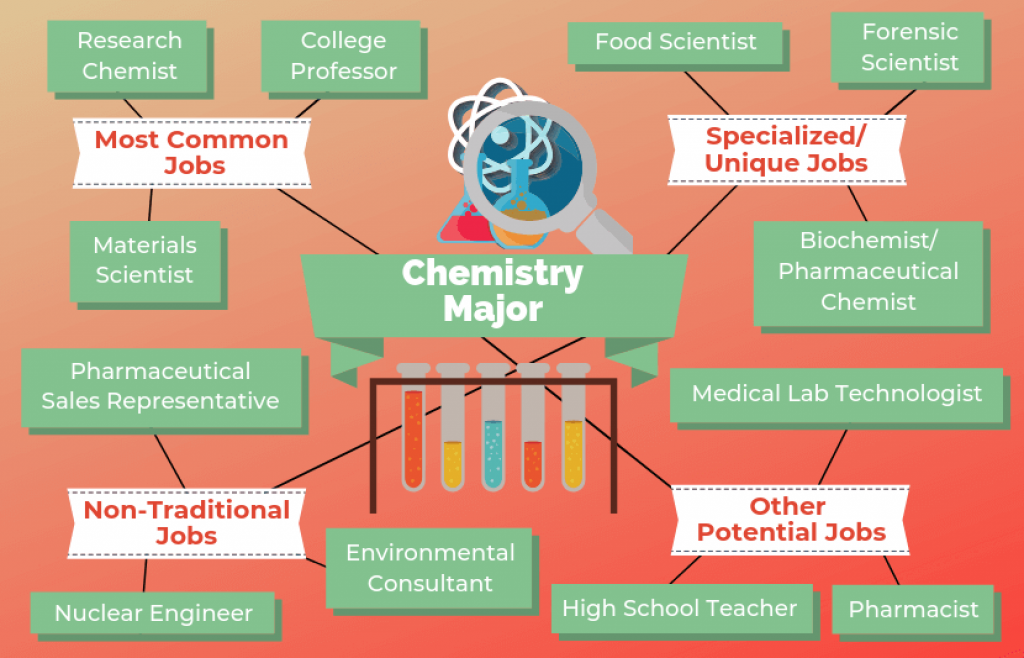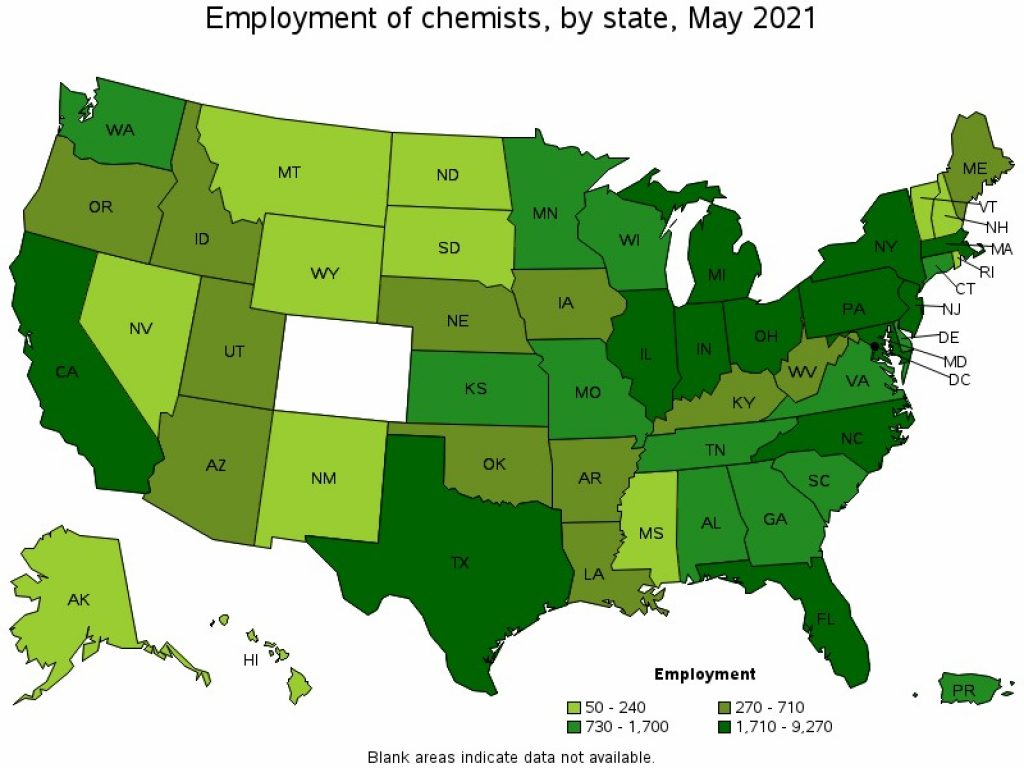Scientists, engineers, and technicians are shaping tomorrow’s world by designing objects that facilitate humanity’s development. If you’re a student looking for a polyvalent scientific career, chances are you’ve already asked yourself — is a degree in chemistry worth it?
Being a chemist is much more than working in a laboratory wearing a white coat and mixing compounds. In reality, a chemistry degree affords you many opportunities across a broad spectrum of industries.
In this article, we discuss career development and employment projections relative to this career path.
Additionally, we outline the avenues you can pursue with a chemistry major and how much you can expect to earn.
Finally, we shine a light on the benefits of studying chemistry.
Table of Contents
Is A Degree In Chemistry Worth It?
A chemistry degree will allow you to work across multiple industries, from pharmaceutical and medicine manufacturing to food processing.
Based on the current mean salary statistics ($89,000) and industry growth projection of 6% from 2020 to 2030 (9,100 job openings each year), it is safe to say chemistry is, in fact, a field worth studying.
Moreover, a degree in chemistry makes you polyvalent — you’ll be able to design the next polymer material or the newest drug against cancer and enhance the flavor of your favorite chips. The possibilities are endless.
6 Areas Of Chemistry
Chemists function at the crossroads of physics, biology, and engineering.
Below, we’ve identified 6 main subfields of chemistry that illustrate the rich diversity of the degree.
- Inorganic chemistry/material science: understanding the behavior and properties of inorganic compounds such as metals, minerals, and organometallics. Example: developing new metal alloys for nuclear reactors that withstand high temperatures.
- Organic chemistry: studying organic reactions, such as the synthesis of molecules (fuel, polymers, drugs), structure, and properties. Example: creating a new bio-polymer that naturally degrades when immersed in water.
- Analytical chemistry: studying and reporting the chemistry and properties of matter (organic and inorganic compounds) and developing tools and instrumental methods to analyze any compound. Example: developing a device capable of analyzing the composition of a gas.
- Chemical engineering: developing processes and tools for mass production of chemical compounds. Example: Design a plant to produce refined fuels.
- Physical chemistry: study small scales phenomena (molecular and atomic level) at the edge of physics. Example: developing new material for solar panels.
- Biochemistry: studying chemical substances’ composition, structure, and behavior in contact with living organisms. Example: developing a nano-drug targeting cancer cells in the human body.
In addition to the above, there are numerous disciplines in which chemists can operate, such as electrochemistry, nuclear chemistry, radiochemistry, astrochemistry, and more.
Related Reading: Is Environmental Science Worth It? (An expert’s opinion)
Employment Growth Projection For A Chemistry Major
Before venturing into a chemistry major, it’s best to establish whether you’ll be able to turn this degree into a lifelong, financially viable career path.
We selected the most relevant statistics from the U.S. Bureau of Labor Statistics to determine whether a degree in chemistry is worth it.
USA Statistics
- In 2021, there were 80,600 people employed as chemists.
- It is expected that 9,100 job openings will be available to chemistry majors each year for the next 10 years.
- There is a 6% growth rate, in line with the average employment growth projection in the U.S.
Do Chemistry Majors Have A Good Future?
Yes, by examining the employment forecast and salary projections, we can safely say that chemistry majors have a promising future.
Furthermore, chemists are at the forefront of innovation which drives all major industries worldwide. As such, they are a perfect fit for future job openings.
Related Reading: How To Become A Solar Panel Engineer (Complete guide)
What Jobs Can You Get After Studying Chemistry?
After studying chemistry, you’ll have a broad knowledge, so you could end up working in an oil company or a food processing plant.
Industries Hiring the Highest Number Of Chemistry Majors
- Pharmaceutical and Medicine Manufacturing
- Scientific Research and Development Services
- Architectural, Engineering, and Related Services
- Chemical Manufacturing
- Petroleum and Coal Products Manufacturing
- Food and beverage manufacturing
- Waste Management and Remediation Services
- Waste Treatment and Disposal
- Medical Equipment and Supplies Manufacturing
- Plastics and Rubber Products Manufacturing

Source: The University Network
Most Common Jobs Associated With Studying Chemistry
Chemists have access to more than 40 different jobs. The following are the most common positions associated with studying chemistry:
- Research Scientist
- Chemical Engineer
- Toxicologist
- Analytical Chemist
- Chemical Technician
- Food Scientist and technologist
- Forensic Science Technician
- Science Teacher
- Clinical Laboratory Technologist
- Environmental Scientist or Specialist
- Industrial Production Manager
- Medicinal Chemist
- Synthetic Chemist
- Hazardous Waste Chemist
- Water Chemist
- Geochemist
Research Scientist
A scientific researcher is at the forefront of knowledge discovery for human development. A research chemist needs to understand how organic and inorganic systems interact to develop new molecules and compounds to fulfill our quest for innovation.
Required education: Ph.D. and Post-doctoral experience.
Mean annual wage: $108,620
Chemical Engineer
Chemical engineers tend to work for private firms. Their job involves producing and manufacturing products (fuels, food, drugs, etc.) through a chemical process. They can monitor and design a chemical plant and improve the production process.
Required education: master’s degree.
Mean annual wage: $105,550
Toxicologist
A toxicologist is an analytical chemist. Their job involves analyzing substances and compounds to determine if they are toxic to humans and the environment. A toxicologist works in a laboratory and combines their chemistry, biology, and medical knowledge to compile toxicological reports.
Required education: bachelor’s degree
Mean annual wage: $89,000
Analytical Chemist
Analytical chemists determine compounds’ composition and structural arrangement at the molecular or atomic level (qualitative and quantitative measurements). In addition, they can also design new analytical methods and tools.
Required education: bachelor’s degree.
Mean annual wage: $61,000
Food Scientists & Technologists
A food scientist uses chemistry, microbiology, and engineering knowledge to process and analyze food. For example, they can determine the sugar, proteins, and vitamins level in a product and develop new ways to make processed food healthier and safer.
Doing this allows them to work closely with cooks in a food processing plant to create and improve processed food recipes.
Required education: bachelor’s degree.
Mean annual wage: $78,340
Medicinal Chemist
A medicinal chemist possesses a wealth of biology-related knowledge and works closely with pharmacists to design and produce new drugs.
They use various techniques, such as organic synthesis and analytical tools, to develop and improve molecules of interest.
Additionally, medicinal chemists work with chemical engineers to scale up drug production processes.
Required education: master’s degree.
Mean annual wage: $95,000
Water Chemist
A water chemist is an analytical chemist specializing in water processing. They control drinking water quality through analytical methods and monitor and develop wastewater treatment techniques.
With an engineering background, a water chemist can design and operate water desalination plants.
Required education: bachelor’s degree.
Mean annual wage: $57,000
Forensic science technicians
A forensic science technician applies analytical technics to criminal investigations. They collect, identify, and analyze evidence from a crime scene. In addition, they may testify as an expert witness during a trial.
A professional of this nature becomes a specialist in various areas such as fingerprinting, DNA analysis, ballistics, or biochemistry.
Required education: bachelor’s degree.
Mean annual wage: $61,000
Can Chemistry Majors Find Jobs Easily?
Chemistry is often considered a central science; therefore, chemistry majors are highly sought-after scientists.
In addition, fewer students are taking chemistry as a major. Consequently, there is a healthy demand for those with chemistry diplomas.
To maximize the chance of finding a job as a chemist, we recommend looking for states with developed chemical industries.
In the U.S., California, New Jersey, Pennsylvania, Massachusetts, and North Carolina employ the most chemists. Furthermore, Delaware has the highest proportion of chemists relative to its workforce (2.98%).

Source: U.S. Bureau of Labor Statistics
Related Reading: Is Electrical Engineering Worth It? (According to an expert)
How Much Does A Chemistry Major Earn?
Depending on your degree level, you can earn between $45,000 and $112,929 as a chemistry major. For instance, the average starting salary for a chemist with a bachelor’s degree is $57,000.
Chemistry majors with a master’s degree or a Ph.D. earn even more, with a median starting salary of $112,929.
Company size also appears to influence salaries. For firms with 50 employees or less, the starting salary is $45,000, whereas, for larger companies, the base salary can reach $60,000.
Please note: a chemistry major’s salary is also location dependant. Higher salaries are found in California, Alaska, Massachusetts, New Jersey, and Connecticut, whereas lower salaries are located in states such as Wyoming, Utah, Nebraska, and South Dakota.
Source: Zippia.com 
Related Reading: Is Mechanical Engineering Worth It? (According to an expert)
3 Benefits Of Studying Chemistry
1. Central Knowledge In Science
Chemistry is often called the central science, as it crosses many other disciplines, such as physics, biology, geology, and medicine.
Studying chemistry will give you unique knowledge that other scientists won’t match.
2. Work In Diverse Industries
Thanks to your central knowledge, your work opportunities are multiplied. As a chemist, you’ll have a broad career path (over 40 fields of work) that could lead you to work in various entities, such as academic institutions, government agencies, industrial firms, and even non-profit organizations.
3. Attractive Salary & Work Conditions
Chemistry is among the top paying professions. We’ve shown that the average starting salary with a bachelor’s degree is $57,000; that figure is up to $112,000 with a doctoral degree. After a few years of experience, the average salary for a chemist is close to $90,000.
In addition, the tasks performed don’t require physical effort, and the work is primarily done in a controlled environment.
Related Reading: Is Civil Engineering Worth It? (According to an expert)
Final Thoughts
Is a degree in chemistry worth it?
Well, a degree in chemistry is perhaps the most polyvalent field in science. It gives a broad range of opportunities with more than 40 jobs accessible across various industries.
Salaries for chemistry majors are attractive, with an average starting salary of $57,000 for a bachelor’s degree and more than $112,000 for a master’s degree. Moreover, Ph.D. employment perspectives are also bright, with 9,100 job openings yearly.
Furthermore, chemists are flexible and ready for future jobs in newly created industries such as renewable energy: solar energy, battery storage, thermoelectricity, and hydrogen fuel cells.
We hope that after reading this article, you are now more interested in pursuing a rewarding chemical career.

